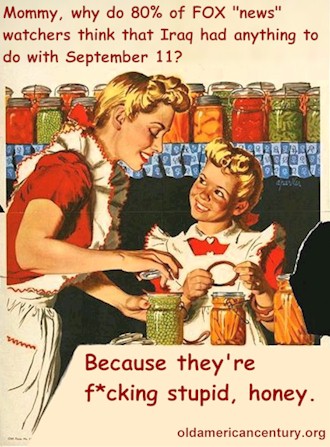 Democratic Presidential nominee Barack Obama says that American voters are smart enough to see through Republican spin and trickery. Republican Presidential nominee John McCain says that American voters are smart enough to ignore Democratic hype and see who the real change agents are in this election.
Democratic Presidential nominee Barack Obama says that American voters are smart enough to see through Republican spin and trickery. Republican Presidential nominee John McCain says that American voters are smart enough to ignore Democratic hype and see who the real change agents are in this election.
What if neither of them are right?
The Washington Post published a story earlier this week that supports scientific views that today's voters are more uninformed than ever. Today's voters, the article states, don't follow politics and they don't know how their government works either. According to an August 2006 Zogby poll, only two in five Americans know that we have three branches of government and can name them. A 2006 National Georgraphic poll showed that six in ten young people (aged 18 to 24) could not find Iraq on a map.
Worse, they found that only 49 percent of Americans know that the only country ever to use a nuclear weapon in a war is their own.
True, voters can tell you the name of Sarah Palin's daughter and that she's pregnant or that Barack Obama's father was black and his mother was white. But most of what they know about the candidates' positions on the issues -- and remember, our candidates are running to make policy, not talk about their family members -- comes from television.
Some say that if you just give Americans the facts, they'll be able to draw the right conclusions.
Wrong.
"Many social scientists have long tried to downplay the ignorance of voters, arguing that the mental "short cuts" voters use to make up for their lack of information work pretty well," the Post reported. "But the evidence from the past few years proves that a majority can easily be bamboozled."
 Just before the 2003 invasion of Iraq, after months of unsubtle hinting from Bush administration officials, some 60 percent of Americans had come to believe that Iraq was behind the Sept. 11, 2001, terrorist attacks, despite the absence of evidence for the claim, according to a series of surveys taken by the PIPA/Knowledge Networks poll. A year later, after the bipartisan, independent 9/11 Commission reported that Saddam Hussein had had nothing to do with al-Qaeda's assaults on the World Trade Center and the Pentagon, 50 percent of Americans still insisted that he did. In other words, the public was bluntly given the data by a group of credible, bipartisan officials, and Americans still didn't absorb the most basic facts about the most important event of our time.
Just before the 2003 invasion of Iraq, after months of unsubtle hinting from Bush administration officials, some 60 percent of Americans had come to believe that Iraq was behind the Sept. 11, 2001, terrorist attacks, despite the absence of evidence for the claim, according to a series of surveys taken by the PIPA/Knowledge Networks poll. A year later, after the bipartisan, independent 9/11 Commission reported that Saddam Hussein had had nothing to do with al-Qaeda's assaults on the World Trade Center and the Pentagon, 50 percent of Americans still insisted that he did. In other words, the public was bluntly given the data by a group of credible, bipartisan officials, and Americans still didn't absorb the most basic facts about the most important event of our time.
Despite being more educated than our parents and grandparents, studies find that our generation is less politically savvy than our forefathers and mothers. In 1940, six in ten Americans hadn't made it past the eighth grade.
Education levels are far higher today, but as the Post reports, schooling does not equal better educated voters.
In the 1950s, only 10 percent of voters were incapable of citing any ways in which the two major parties differed, according to Thomas E. Patterson of Harvard's Kennedy School of Government, who leads the Pew-backed Vanishing Voter Project. By the 1970s, that number had jumped to nearly 30 percent.
One of the biggest myths today, the article says, is that young voters are paying a lot of attention to the news, and thus will make intelligent choices in the voting booth.
Wrong again.
Despite all the hoopla about young voters -- the great hope of the future! -- only one news story in 2001 drew the attention of a majority of them: 9/11. Some 60 percent of young voters told Pew researchers that they were following news about the attack closely. (Er -- 40 percent weren't?)
Another Pew survey measured public knowledge of current events and found that the young (aged 18 to 29) "know the least." A majority of young respondents scored in the "low knowledge" category -- the only demographic group to do so.
And some other statistics are even more alarming. How many young people read newspapers? Just 20 percent. (Worse, studies consistently show that people who do not pick up the newspaper-reading habit in their 20s rarely do so later.) But surely today's youth are getting their news from the Internet? Sorry. Only 11 percent of the young report that they regularly surf the Internet for news.
 Do you want uninformed people in the voting booth this fall?
Do you want uninformed people in the voting booth this fall?
No comments:
Post a Comment